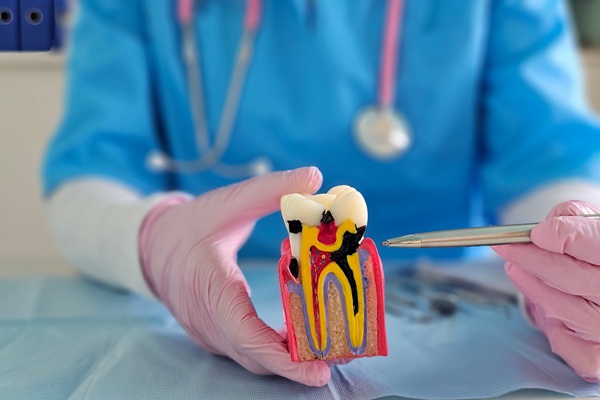Pain and Root Canals: What You Should Know

A root canal is one of the most effective treatments for saving a natural tooth and preserving oral health. While they have a negative reputation for being painful, this is no longer the case with modern pain management techniques. General dentists prioritize patient comfort during and after a root canal. Understanding the root canal process and what to expect afterward can help reduce worry and support a healthy recovery.
The root canal procedure
A root canal removes the infected pulp tissue from inside the tooth. The pulp, which contains nerves and blood vessels, can become inflamed or infected due to deep cavities, cracks, repeated dental procedures, or dental trauma. Once this occurs, the pulp cannot heal on its own and must be removed to prevent further complications. Thus, a general dentist will use dental X-rays to identify a deep infection and confirm the need for a root canal.
To begin root canal therapy, the dentist applies local anesthesia to numb the area, ensuring the procedure is as comfortable as possible. Once the area is fully numb, they will make a small opening in the tooth to reach its pulp chamber and root canals. Next, the dentist removes the infected pulp and cleans, shapes, and fills the tooth. The dental team then covers the opening with a temporary or permanent filling. The dentist will likely recommend a dental crown to restore the tooth’s full function and appearance.
Root canals and pain
Root canals are constantly associated with pain. However, the procedure itself is usually no more uncomfortable than receiving a dental filling or crown. The pain that patients often attribute to root canals typically stems from the infection present before treatment, not the procedure itself. Once the dentist removes the affected tissue and disinfects the canal, the patient typically feels immediate relief from the discomfort they were feeling before the procedure.
General dentists also rely on advanced tools and techniques that prioritize comfort throughout root canal therapy, making the experience more manageable. As previously mentioned, this can involve the use of local anesthesia to numb the area. It is normal to feel slight pressure or vibrations as the dentist completes the procedure, but they should not experience sharp pain.
Managing pain after a root canal
Mild sensitivity or discomfort is common after root canal therapy and can typically be managed with over-the-counter pain relievers. In order to protect the tooth, patients should avoid chewing on the treated side until the dentist places the permanent restoration. Additionally, gentle brushing, salt water rinses, and avoiding hard foods support healing and reduce irritation. If the dentist prescribes antibiotics, the patient will need to complete the full course to prevent postoperative infection and promote a smooth recovery.
Root canals make for a more comfortable smile
Although root canals have a poor reputation for being painful, they relieve pain in the long run. This is because once the inflamed or infected tissue is removed, the pressure, swelling, and sensitivity that caused the discomfort are resolved. Learn more in an appointment with the Taylormade Dental & Implant Center LLC team at our Kilgore office.
Request an appointment here: https://www.taylormadedentalandimplantcenter.com or call Taylormade Dental & Implant Center LLC at (903) 615-1116 for an appointment in our Kilgore office.
Check out what others are saying about our dental services on Yelp: Root Canal in Kilgore, TX.
Related Posts
Wondering when you should see an emergency dentist? Read on to learn more. Regular dental care can prevent emergency dental treatment. Unfortunately, dental emergencies do happen unexpectedly, even if you brush and floss regularly. In such cases, it is a great idea to visit an emergency dentist immediately.Many people do not know whether their dental…
Complications after a tooth extraction are uncommon, but understanding the warning signs helps protect long-term oral health. During healing, problems such as infection, dry socket, or prolonged bleeding can occasionally develop. Knowing what to watch for and when to call a dentist supports a smoother recovery. Below are a few things to watch for after…
All-on-4 dental implants offer a streamlined alternative for patients seeking a full-arch tooth replacement. This approach uses just four implants per arch to support a complete set of prosthetic teeth, delivering both functional and aesthetic improvements. Patients exploring this solution should understand what sets it apart from traditional options and what to expect during and…
Invisalign® is a fast way to straighten teeth, using clear, removable trays. However, smoking can negatively impact patient comfort and aligner appearance throughout treatment. It can even prolong treatment times. Learning more about how smoking can affect Invisalign treatment can help motivate patients to limit or quit tobacco altogether.Smoking tobacco can reduce the efficacy and…
